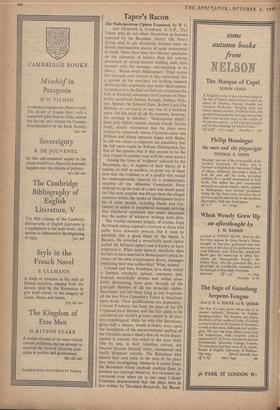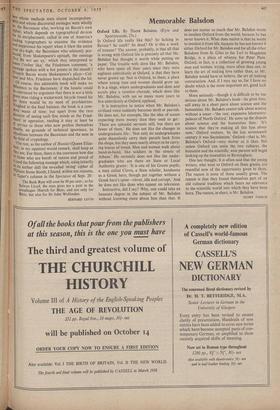Taper's Bacon
The Shakespearean Ciphers Examined. By W. F.
and Elezcbeth S. Friedman. (C.U.P., 25s.) THosE who do not allow themselves to become annoyed by the Baconian 'theory' (Sir Henry Irving used to get absolutely furious) have an almost inexhaustible source of quiet amusement at hand. There have been few funnier spectacles on the sideroads of history than this solemn procession of raving lunatics holding aloft their banners with the message, awe-inspiring in its idiocy 'Bacon wrote Shakespeare.' What makes the spectacle even funnier is that something like a quarter of the marchers are holding banners declaring that somebody else wrote Shakespeare. Sometimes it is the Earl of Oxford, sometimes the Earl of Rutland, sometimes the Countess of Pem- broke, sometimes Jonson, Raleigh, Dekker, Web- ster, Spenser, Sir Edward Dyer, Robert Cecil (the Bobbety de se's lours), or any one of a hundred more. On -the back of all the banners, however, the message is identical : 'Shakespeare didn't.' (One jolly fellow, indeed, named Joseph Martin Feely, stoutly maintained that the plays were written by somebody whose Christian name was William and whose surname began with Shake; he did not refuse to entertain the possibility that the full name might be William Shakespeare, but was of the opinion that if that proved to be the case it must be another man with the same name.)
Among the items of 'evidence' adduced by the Baconians, etc., in support of their theory (it is useless, as well as needless, to point out to these nuts that the evidence is of a quality that would be contemptuously rejected by a probationary member of the Albanian Communist Party ordered to rig the trial of a deaf and dumb pussy cat) the most popular has always been the alleged existence within the works of Shakespeare (and a lot of other people, including Dante and Cer- vantes) of coded or enciphered messages proving that whichever candidate was under discussion was the author of whatever writings were ditto.
The trouble stemmed largely, of course, from the breath-taking ingenuity common to those who suffer from dementia prweox; but it must be admitted that a good share of the blame is Bacon's. He invented a remarkably good cipher (called the Biliteral cipher) and is known to have employed it. What more natural, therefore, than for him to have inserted in Shakespeare's plays, by means of his own cryptological device, messages indicating their true authorship? What, indeed.
Colonel and Mrs. Friedman, in a study which is learned, scholarly, patient, courteous, deft, ordered, beautifully written and withal abso- lutely devastating, have gone through all the principal theories of all the principal cipher- Baconians, and left them lying in tiny fragments all the way from Canonbury Tower to Stratford- upon-Avon. Their qualifications are impressive : Colonel Friedman has been the head of the US Cryptanalytical Bureau, and has fair claim to be considered the world's greatest expert in all mat- ters cryptological, while his wife (the Baconians, given half a chance, would probably erect upon the foundation of the unconventional spelling of her Christian name a theory that she wrote Shake- speare) is scarcely less noted in the same field. One by one, in their relentless solvent, the theories become blurred, misty, transparent and finally disappear entirely. The Batonians who altered their own rules, or the texts of the plays they were investigating, whenever it suited them; the Baconians whose methods enabled them to produce any message whatever, but remained un- convinced even when (as in one case) Colonel Friedman demonstrated that the plays were in fact written by Theodore Roosevelt; the Bacon- tans whose methods were almost incomprehen- lible and whose discovered messages were wholly 80; the Baconians who, working on Bacon's own eipber, which depends on typographical devices 10r its encipherment, called in one of America's leading typographers to examine the evidence and suppressed his report when it blew the entire dease sky-high; the Baconians who solemnly pro- ',aced, from Shakespeare's epitaph, the message 'rra Ba wrt ear ay,' which they interpreted to ('rather like,' the Friedmans comment, 'a message spoken with a hot potato in the mouth') 'Francis Bacon wrote Shakespeare's plays—Col- anel and Mrs. Friedman have dispatched the lot. , Of course, this admirable book will make no oilference to the Baconians; if the lunatic could be Convinced by argument that there is not a little tr een man riding a wickerwork bicycle round his a.t there would be no need of psychiatrists.
sts.
weighed in the final balance, the book is a corn- Plete waste of time; but apart from the rare Pleasure of seeing such fine minds as the Fried- IllanS in operation, reading it may at least be of service to those who now profess themselves atable, on grounds of technical ignorance, to adjudicate between the Baconians and the sane in the field of cryptology. The rest, as the author of Hamlet (Queen Eliza- beth, in my opinion) would remark, shall keep as theY are. For them, there is the courteous bow due to those who are bereft of reason and proud of and the following message which, using (exactly as its author did) the so-called 'string' cipher of Stone Booth, I found, within ten minutes, In Taper's column in the Spectator of Sept. 20:
The Bank Rate will soon be 90 per cent.; as for Selwyn Lloyd, the man gives me a pain in the esophagus. Hurrah for Bisto, and not only for Bisto, but also for Sir John Wolfenden.
RERNARD LEVIN























































 Previous page
Previous page